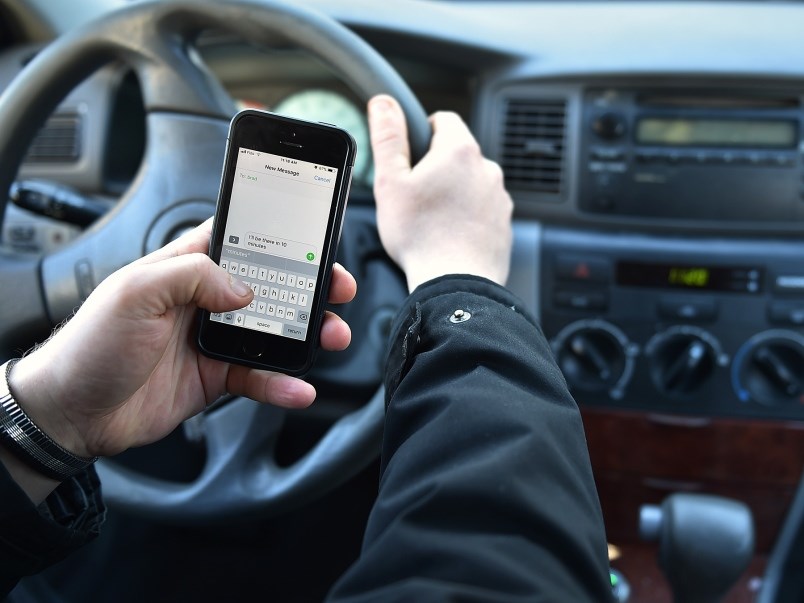Imagine driving a whole city block with your eyes closed.
Sounds crazy, right? But that’s essentially what you’re doing every time you text while driving.
“The average text message takes 4.6 seconds to construct and send,” said Dr. Ian Pike, executive director at the Community Against Preventable Injuries. “That’s like driving with your eyes closed for an entire city block.”
It’s a now familiar refrain — ICBC and police were reminding drivers to take a break from their phones while behind the wheel Thursday morning as they kicked off another month-long campaign against distracted driving. And while that point has been hammered home again and again in recent years, as the fines have increased, it seems many drivers are still not getting the message.
Every year in the Lower Mainland, an average of 27 people are killed in distracted driving-related crashes. It’s now the second leading contributing factor in fatal collisions, ahead of impaired driving — speed is the number one factor in fatal crashes, said Lindsay Matthews, ICBC’s interim vice-president responsible for road safety.
“Studies show drivers who are talking on their phone lose about 50 per cent of what’s going on around them, so you’re less likely to see cyclists and pedestrians when you’re distracted,” Matthews said.
In a recent Ipsos Reid survey conducted for ICBC, almost all drivers polled recognized that distracted driving has led to an increase in crashes and that phone use, especially texting, while behind the wheel is risky. However, over one third admitted to using their phone while driving at least one out of every 10 trips.
In Vancouver, in the month of March alone, officers handed out more than 2,000 “use of electronic device” tickets, said Deputy Chief Howard Chow. He added that just Thursday morning officers pulled over a delivery truck driver who had an iPad on the dash and a cell phone in his hand. Another driver was caught last week going 115 kilometres an hour over the Georgia Street viaduct while using a cell phone. In that case the driver was not only fined for both using the cell phone and speeding, but the car was impounded.
“It’s time we all commit to taking a break from our phones and devote our attention to driving smart,” Matthews said.
But, that’s easier said than done.
“The problem, of course, is that these devices are highly addictive,” Pike said. “Researchers have described the addiction to be similar to that of internet gambling, shopping and video game addiction.”
Just how addictive is it? Pike rattled off some statistics — over 90 per cent of North Americans own a cell phone, 60 per cent of college students consider themselves to have a cell phone addiction, over 70 per cent of people sleep with their cell phone in bed with them, over 35 per cent of people check their phone constantly, and over 54 per cent of young adults check it continually, “even if it hasn’t given them a warning or an incoming message signal.”
“Forty per cent never ever disconnect from their phones and 44 per cent say they could not go a day without their phones, even when they’re on vacation,” he said.
“Unfortunately too many people believe that they are able to satisfy their addiction to utilize this and to be able to carry on complex tasks like driving both at the same time,” Pike said. “They believe that they’re able to multitask. Of course, we know this is an impossibility.
“The human brain is a fantastic thing, however, it’s only able to attend to and process information one thing at a time.”
Matthews said the research has shown that there’s an intellectual understanding that it’s dangerous but “when it actually comes to the activity, people aren’t making that connection and that speaks to the core of addiction.”
“Addictive behaviour is a serious issue and it’s very, very difficult... Your body is fighting brain chemicals and endorphins that are satisfied that are exacerbated during that addictive behaviour,” Pike said. “So getting past this is a little more challenging than simply saying, ‘I won’t do it.’”
Chow and Pike recommend that if you can’t leave your phone alone while driving put it out of reach — lock it in the trunk.
@JessicaEKerr
jkerr@vancourier.com



